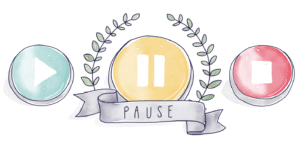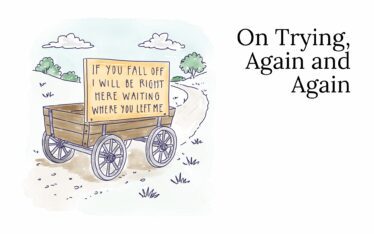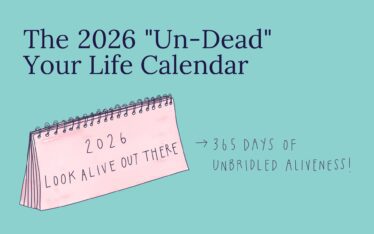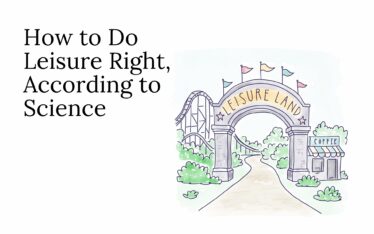Hold up, Type A friend — don’t go heading for the hills at the mere mention of a break in your action.
The hustle and bustle will still be waiting for you when you return from the breath-catching hiatus as a Highly Productive Member of Society. (I sound all judgy but I am a card-carrying member of that Society and so I feel your “I MUST GO-GO-GO-OR-ELSE-WHAT-IS-MY-VALUE-AS-A-HUMAN” pain.)
 This post is brought to you by the season of summer — that three-month window of permission to take time off and feel 27% okay with checking email intermittently instead of every three minutes. Pausing, as we’ll talk about in a quick sec, is actually a power move. Taking a break, counterintuitively, helps bring even more productivity out of us, so if Getting Shit Done sounds like part of your identity, then you might want to make both short and long pauses a regular part of your persona.
This post is brought to you by the season of summer — that three-month window of permission to take time off and feel 27% okay with checking email intermittently instead of every three minutes. Pausing, as we’ll talk about in a quick sec, is actually a power move. Taking a break, counterintuitively, helps bring even more productivity out of us, so if Getting Shit Done sounds like part of your identity, then you might want to make both short and long pauses a regular part of your persona.
Prolonged vs. pint-sized pauses
Let’s consider a prolonged pause to be anything longer than a single day off work/ your usual routine, and although we suck because 55% of us leave unused vacation days on the table each year, most of us know the restorative benefits of taking uninterrupted time off from the grind of our usual daily lives. Wait — you need a refresher? Prolonged pauses lead to…
- Decreased stress (preventing the ever-dreaded feeling of overwhelm)
- Sharper thinking (increasing memory and creativity)
- Improved productivity (which comes from boosted energy and a refreshed perspective)
- Suntans and flings on the beach and other piña colada-soaked memories to cherish for a lifetime
In comparison, a pint-sized pause is the most overlooked and underestimated type of break out there. Vacations and long weekends are few and far between for those of us who don’t own yachts, so how do we recharge in baby-break-bursts?
Five ways to pint-size pause yourself to a better life:
#1: Practice the proactive pause. You’re living at a break-neck speed, and you know that life won’t slow down to check in on you, right? To see if you’re feeling a wee bit dehydrated, or a little demotivated at work as of late? When you’re feeling frazzled and desperate for a break, you’re already broken (not fundamentally flawed and wrecked as a human — maybe just cracked around the edges). Why not intersperse little pause pulses into your life? Didn’t Ben Franklin say that “an ounce of prevention is worth a pound of cure?” Block of “DO NOT DISTURB ME, YOU ASSHOLES” time into your calendar every single week for catch-up time. Make a routine to end your day with 5 minutes of stretching and listing 5 things you were grateful for that day. Plan for alone time that you actually adhere to, even if it’s 30 minutes early Saturday morning before your family wakes up and drains the energy out of you. Carve out social snacking time with friends/ date nights, like clockwork. Register for a class that forces you to take a break from work (like a 6pm restorative yoga class, or an 8-week pottery class). Bottom line: pause before you need to pause.
#2: Hold on for a hot minute between stimulus and response. The gap you have the power to create between whatever’s going on and how you choose to react… that can make the difference between getting promoted vs. fired, getting married vs. divorced, being invited to the pool party vs. sitting home alone wondering how you’ve managed to ostracize yourself from all your friends with pools. When an annoying stimulus occurs (like a passive-aggressive comment from your boss, or an inflammatory email from your mother-in-law, or a severely unflattering glimpse of yourself in the mirror)… PAUSE. Consider your range of responses. Weigh your options. Make a deliberate choice how to respond to your boss, your mother-in-law, your inner critic. You might still take the bait, but you’re less likely to escalate the drama if you hold on and make a conscious decision like, “what would the best version of me do right now?” (Shattering your fattening mirror might very well be an acceptable response.)
#3: Wait a beat between sentences in conversations. Most of us listen to others with eager anticipation — not because of what the other person is saying, but because of what WE’RE about to say next. We cook up an assortment of witty and wise responses and we jump in as soon as our conversation partner takes a breath/ sip of coffee. What might the conversation be like if you didn’t jump in with your response right away? What if you waited a beat? Usually the other person gets a chance to add in a new thought or observation, and usually this addendum is gold. Making space for people to talk — letting them feel truly listened to — is one of the most profound gifts of connection you can offer a human. (B. Joseph Pine II has a great line about this: “The experience of being understood, versus interpreted, is so compelling you can charge admission.” Listening helps people feel understood. And think of all that admission money you can make!)
#4: Press the pause button to absorb new info. It’s an annoying thing about adult learning that we can’t just learn something new and have it seep into our pores. No (*tired-sounding sigh*). We need to marinate in the information, and the only way I’ve seen that work is through intentional reflection time. We have to stop and put the pieces together in our chock-full little heads: “How does this information apply to me? What do I want to do with this new info, if anything? What’s the first specific step I could take to out this learning to use?” Pause to map out a plan (like after a conference when your head is swimming with information overload), or write down your ideas about the ideas (ideas squared!) in a notebook or spreadsheet, or talk to a coach or colleague about ways to make the learning come alive.
#5: Plan a mini personal retreat. My friend Kevin used to take the train from Chicago to Kalamazoo every few months, where he’d sit in the lobby of a nice hotel for the day and Figure His Shit Out (my words, not his). He’d evaluate what was working + not working in his work and life, and then reorganize his priorities. And then he’d hop on the train back to Chicago and be home for a late dinner, all psyched to live a better life. Pausing for a single day helped him focus on the things that mattered. Where might you take a mini-retreat? You don’t need to take the train to a fun-named town, although a change of scenery is recommended. How much time can you spare? A half day? A full day? A — gasp! — stay overnight deal?
Pausing and memento mori
Surprise! Because all roads lead back to your pending mortality with me (AREN’T YOU SO GLAD WE’RE FRIENDS?), we’re going to go to the dark side for a moment or two.
Have you heard of the medical pause? It’s when medical professionals take a few moments after a patient has died, to acknowledge their passing and the efforts of the healthcare team. This practice, introduced by Jonathan Bartels, RN, has now become a movement. Here are a few choice words from Bartels:
Forty-five seconds, maybe a minute, a minute and a half. For us, pausing has made all the difference. This pause honors those lives that do not get saved and gives us a moment to contemplate the passage and bring the sacred into what is often a profane environment. In so doing, we recognize this sad rite of passage.
Our pause, in its own way, breathes life back into what can feel like an airless, emotionless room where we work. With it, we stop and allow ourselves to be present in the natural, real events that have unfolded. We are together, yet apart. We recognize that stillness is very human, as is the desire to tamp down things that hurt, disappoint, and exhaust. But we become still. In my own practice, I am learning to try not to tamp my feelings down as much.
The pause slows our racing minds, offering mental space so that we are not drawn into the vortex of failure versus success. We bear witness to a reality devoid of projections… It is simplicity infused with complexity. We are called to bear witness to the reality of loss and the acceptance of reality.
As profound and respectful as it sounds for the medical community to implement, I don’t want us to experience the medical pause first-hand any time soon. But I do want us to consider a ‘before-we-croak’ pause that helps us accept the reality of our finite lifespans.
Contemplating your mortality can help you wake up to life and sharpen the way you prioritize what you do with however many Mondays you have left. So the most impactful pause of all might be the one you’re taking to read this right now: the candid, gentle acknowledgment that you are a beautiful ticking time bomb of a life (sorry!), and that you still have time to fill your time with vitality and meaning (silver lining!). Punctuate your existence with pauses. It’s a power move for us mere mortals.


Oh and just in case you missed it… I’d love you forever if you took 16 minutes out of your life to watch my TEDx talk!






